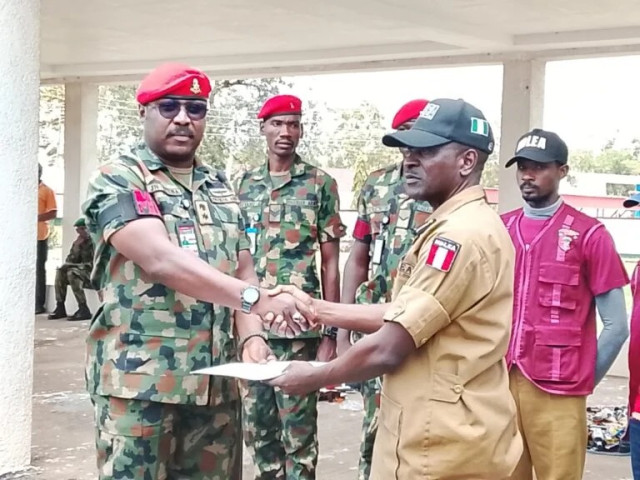Military officials at the Jaji Military Cantonment in Kaduna State have declared the dismantling of drug cartels and have arrested individuals suspected of drug dealing in the surrounding communities.
The apprehended suspects have been transferred to the National Drug Law Enforcement Agency for further investigation.
The military also refuted allegations claiming it had destroyed civilian properties in the area, labeling such assertions as a smear campaign against the institution.
The Acting Deputy Director of Army Public Relations at the Infantry Corps Centre, Captain Olusegun Abidoye, revealed this information during a press conference and guided tour for journalists in the affected regions on Saturday.
Abidoye expressed serious concern regarding the increasing incidence of social vices, particularly drug trafficking and substance abuse, in communities neighboring the military base.
"These areas include Railway Settlement, Unguwan Loya, Unguwan Aboki, Unguwan Alhaji, and Unguwan Alasan, among others. While these communities provide informal support services to the cantonment, they also present substantial security and social risks.
Some of these settlements intersect with zones designated for military training, posing physical hazards to both residents and military personnel during field exercises involving live ammunition," he stated.
He mentioned that intelligence reports and internal assessments have confirmed organized drug cartels operating within these communities, warning that their activities have led to a disturbing rise in substance abuse cases affecting soldiers' children as well as local civilians.
The military undertook investigations and surveillance that corroborated the existence of widespread drug networks, especially within Railway Settlement and Unguwan Loya.
"These cartels are reportedly run by over 15 identified individuals engaged in the trafficking, sale, and distribution of illicit drugs both within and beyond the cantonment," he remarked.
Abidoye identified several commonly trafficked substances, including Indian hemp, skunk, Exol, ice (crystal meth), crack cocaine, tramadol, and various psychotropic drugs.
He emphasized that the arrests of cartel members are part of ongoing measures to combat drug abuse and secure the cantonment and its surroundings.
Addressing allegations from some online media that the military had destroyed civilian properties, he stated that these claims were entirely unfounded and aimed at damaging the military's reputation.
"The disputed land is under litigation, and the cantonment has been strictly adhering to the court's order to maintain the current situation," he clarified.
According to him, the plaintiffs violated the court order by constructing new buildings and allowing a construction firm to excavate laterite from the property.
He mentioned that the cantonment took legal action by filing an interlocutory injunction to prevent the plaintiffs and the construction company from further excavation until the legal dispute is settled.
Abidoye also mentioned that some businesses have been relocated to a centralized market for enhanced surveillance and security. Regarding the reported disconnection of electricity in certain areas, he asserted that the military had no role in this situation.
Reports indicate that the Jaji Military Cantonment serves as a strategic base for the Nigerian Armed Forces, accommodating several notable institutions, including the Armed Forces Command and Staff College, Headquarters, Infantry Corps Centre, Martin Luther Agwai International Leadership and Peacekeeping Centre, Warrant Officers’ Academy, Nigerian Army School of Infantry, 4 Demonstration Battalion, and 601 Aviation Battalion.
Abidoye accused some residents in the surrounding communities of refusing to vacate military land as they used the location to conceal illegal businesses and engage in criminal activities.
"The cantonment will continue to safeguard all law-abiding citizens within and around its vicinity," Abidoye affirmed.




















